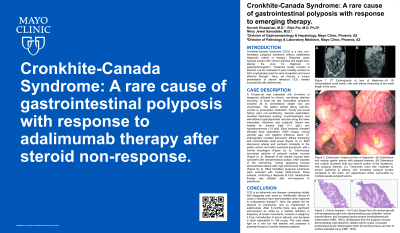Tuesday Poster Session
Category: General Endoscopy
P3415 - Cronkhite-Canada Syndrome: A Rare Cause of Gastrointestinal Polyposis With Response to Emerging Therapy
Tuesday, October 24, 2023
10:30 AM - 4:00 PM PT
Location: Exhibit Hall

Has Audio

Kevork Khadarian, MD
Mayo Clinic
Phoenix, AZ
Presenting Author(s)
Kevork Khadarian, MD1, Rish Pai, MD, PhD2, Niloy Samadder, MD1
1Mayo Clinic, Phoenix, AZ; 2Mayo Clinic, Scottsdale, AZ
Introduction: Cronkhite-Canada Syndrome (CCS) is a rare, non-hereditary polyposis syndrome without established diagnostic criteria or therapy. Reported cases typically present with chronic diarrhea and weight loss, placing the onus for diagnosis on gastroenterologists. Treatment mostly consists of steroids, but the estimated 5-year mortality remains at 55% emphasizing need for early recognition and novel effective therapy. Here, we discuss a unique presentation of steroid refractory CCS, treated successfully with adalimumab.
Case Description/Methods: A 70-year-old man presented with 6-months of dysgeusia, followed by chronic, non-bloody diarrhea occurring 12 times per day. Associated symptoms included a 45 lb unintentional weight loss and onycholysis. The patient denied taking over-the-counter or prescription medication. Family and social history were non-contributory. General examination revealed bitemporal wasting, onychodystrophy and well-defined hyperpigmented macules along the lower extremities. Abdomen was scaphoid. Serum was notable for anemia (Hgb 10.1 g/dL) and hypoalbuminemia (1.9 g/dl). Stool analyses revealed elevated fecal calprotectin (1840 mcg/g), normal osmolar gap, and negative infectious panel. CT enterography revealed pancolonic diffuse thickening and unremarkable small bowel. EGD discovered edema and confluent nodularity in the gastric antrum and entire examined duodenum, with a normal esophagus (Figure 1a, b). Colonoscopy uncovered patches of polypoid nodular mucosa (Figure 1c, d). Biopsies of the nodular mucosa were consistent with hamartomatous polyps, while biopsies of the intervening, normal appearing mucosa demonstrated edema with crypt architectural distortion. Other hereditary polyposis syndromes were excluded with Invitae Multi-Cancer Panel analysis, confirming a diagnosis of CCS. Adalimumab therapy was initiated after non-response to prednisone.
Discussion: CCS is an extremely rare disease—presenting initially with dysgeusia even more so. Additionally, almost all cases in literature have demonstrated some response to corticosteroid therapy. Here, the patient did not respond to prednisone, and so transitioned to adalimumab. After 6-months there was significant improvement as noted by a marked reduction in frequency of bowel movements, increase in weight by 4.9 kg, normalization of serum albumin, and decrease in fecal calprotectin to 198 mcg/g. This case sheds light on a rare but real disease and proposes a potential therapy for steroid refractory patients.

Disclosures:
Kevork Khadarian, MD1, Rish Pai, MD, PhD2, Niloy Samadder, MD1. P3415 - Cronkhite-Canada Syndrome: A Rare Cause of Gastrointestinal Polyposis With Response to Emerging Therapy, ACG 2023 Annual Scientific Meeting Abstracts. Vancouver, BC, Canada: American College of Gastroenterology.
1Mayo Clinic, Phoenix, AZ; 2Mayo Clinic, Scottsdale, AZ
Introduction: Cronkhite-Canada Syndrome (CCS) is a rare, non-hereditary polyposis syndrome without established diagnostic criteria or therapy. Reported cases typically present with chronic diarrhea and weight loss, placing the onus for diagnosis on gastroenterologists. Treatment mostly consists of steroids, but the estimated 5-year mortality remains at 55% emphasizing need for early recognition and novel effective therapy. Here, we discuss a unique presentation of steroid refractory CCS, treated successfully with adalimumab.
Case Description/Methods: A 70-year-old man presented with 6-months of dysgeusia, followed by chronic, non-bloody diarrhea occurring 12 times per day. Associated symptoms included a 45 lb unintentional weight loss and onycholysis. The patient denied taking over-the-counter or prescription medication. Family and social history were non-contributory. General examination revealed bitemporal wasting, onychodystrophy and well-defined hyperpigmented macules along the lower extremities. Abdomen was scaphoid. Serum was notable for anemia (Hgb 10.1 g/dL) and hypoalbuminemia (1.9 g/dl). Stool analyses revealed elevated fecal calprotectin (1840 mcg/g), normal osmolar gap, and negative infectious panel. CT enterography revealed pancolonic diffuse thickening and unremarkable small bowel. EGD discovered edema and confluent nodularity in the gastric antrum and entire examined duodenum, with a normal esophagus (Figure 1a, b). Colonoscopy uncovered patches of polypoid nodular mucosa (Figure 1c, d). Biopsies of the nodular mucosa were consistent with hamartomatous polyps, while biopsies of the intervening, normal appearing mucosa demonstrated edema with crypt architectural distortion. Other hereditary polyposis syndromes were excluded with Invitae Multi-Cancer Panel analysis, confirming a diagnosis of CCS. Adalimumab therapy was initiated after non-response to prednisone.
Discussion: CCS is an extremely rare disease—presenting initially with dysgeusia even more so. Additionally, almost all cases in literature have demonstrated some response to corticosteroid therapy. Here, the patient did not respond to prednisone, and so transitioned to adalimumab. After 6-months there was significant improvement as noted by a marked reduction in frequency of bowel movements, increase in weight by 4.9 kg, normalization of serum albumin, and decrease in fecal calprotectin to 198 mcg/g. This case sheds light on a rare but real disease and proposes a potential therapy for steroid refractory patients.

Figure: Figure 1. Endoscopic imaging at time of diagnosis—(A) Edematous and nodular gastric antrum with polypoid features. (B) Edematous and nodular duodenal bulb and second portion of the duodenum, with polypoid features. (C) Transverse colon with moderate to severe erythema & edema, with increased polypoid burden compared to left colon. (D) Appendiceal orifice surrounded by multiple sessile polypoid lesions.
Disclosures:
Kevork Khadarian indicated no relevant financial relationships.
Rish Pai: Seres Therapeutics, Eli Lilly, Protagonist, Genentech, and Robarts Clinical Trials. – Consultant.
Niloy Samadder: Alimentiv Inc – Consultant. Jansen – Consultant. Recursion Pharmaceuticals – Consultant. Tempest Pharmaceuticals – Consultant.
Kevork Khadarian, MD1, Rish Pai, MD, PhD2, Niloy Samadder, MD1. P3415 - Cronkhite-Canada Syndrome: A Rare Cause of Gastrointestinal Polyposis With Response to Emerging Therapy, ACG 2023 Annual Scientific Meeting Abstracts. Vancouver, BC, Canada: American College of Gastroenterology.
